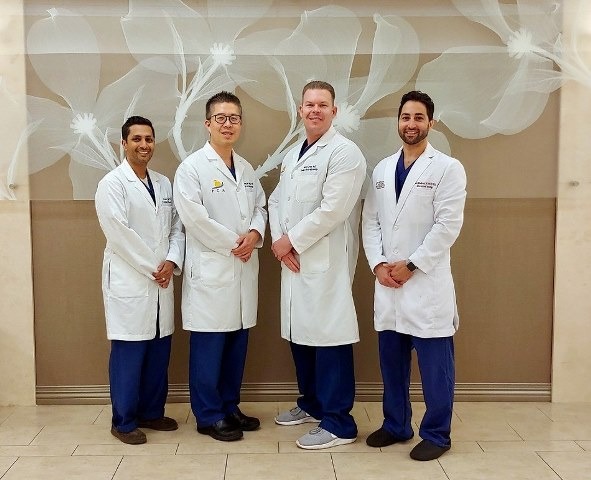
Cardiologists Cheng-Han Chen, M.D., Ph.D.; John Bahadorani, M.D.; Paul Drury, M.D., and Ashish Shah, D.O. recently performed the hospital’s first implants of the Watchman Left Atrial Appendage Closure device on patients with atrial fibrillation, or AFib, an irregular and often rapid heart rate that can increase risk of stroke, heart failure and other heart-related complications.
Saddleback Medical Center is among Orange County’s first hospitals to offer the device, an alternative treatment to long-term blood thinner therapy, reducing stroke risk in patients with AFib not caused by a heart valve issue and deemed unsuitable for long-term blood thinner therapy.
The five million Americans with atrial fibrillation – most common heart arrhythmia in which the heart’s upper chambers (atria) beat irregularly— have a much greater risk of stroke than those with normal heart rhythms.
The Watchman device closes off an area of the heart called the left atrial appendage to keep harmful blood clots that can form from entering the blood stream and potentially causing a stroke. By closing off the left atrial appendage, risk of stroke may be reduced. Over time, patients may be able to stop taking blood thinners.
“I am proud Saddleback Medical Center now offers the Watchman implant as it provides a potentially life-changing stroke risk treatment for patients with non-valvular atrial fibrillation,” says said Dr. Cheng-Han Chen, board-certified interventional cardiologist and medical director, Structural Heart Program at Saddleback Medical Center. “The procedure is minimally invasive and offers patients a quick recovery time.”
“Introduction of this device is just one of the latest innovations introduced at Saddleback Medical Center,” adds its CEO Marcia Manker. “With advanced technology and personalized care, our MemorialCare Heart & Vascular Institute provides comprehensive cardiovascular services for prevention, screenings, diagnosis, treatment and rehabilitation of heart and vascular disease.”
As a permanent device, the Watchman does not have to be replaced and cannot be seen outside the body. The procedure, completed under general anesthesia, takes about an hour. Patients typically stay in the hospital overnight and leave the next day.
MemorialCare Saddleback Medical Center has been listed among America’s Best Hospitals, Best of Orange County Hospitals, Truven Top 50 U.S. Cardiovascular Hospitals, American Heart Association/American Stroke Association Cardiac and Stroke Care Gold Plus and is one of a few U.S. hospitals to earn Thrombectomy-Capable Stroke Center certification from The Joint Commission in collaboration with American Heart and Stroke Associations. Centers of Excellence include cancer, heart, orthopedics, spine, diabetes, neuroscience, gastroenterology, emergency and critical care, breast health, imaging, women’s health, geriatrics, and minimally invasive and robotic-assisted surgery.
Source: Company Press Release






